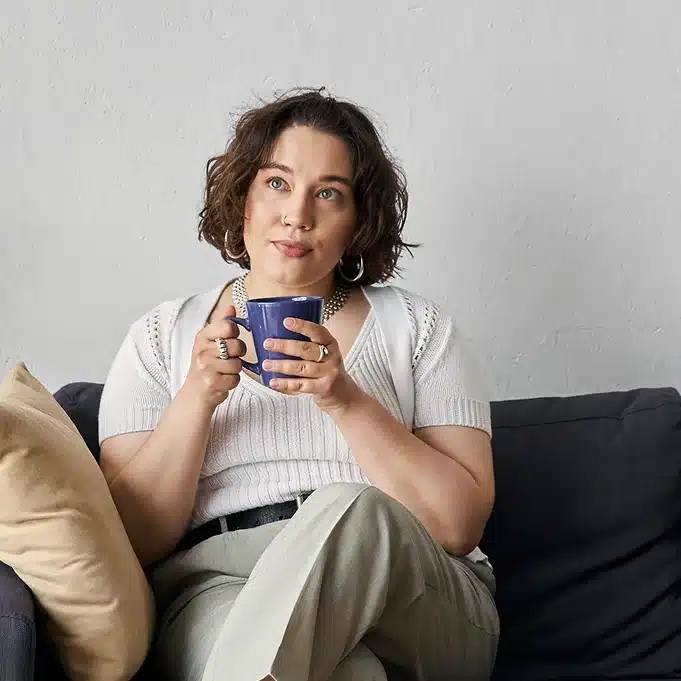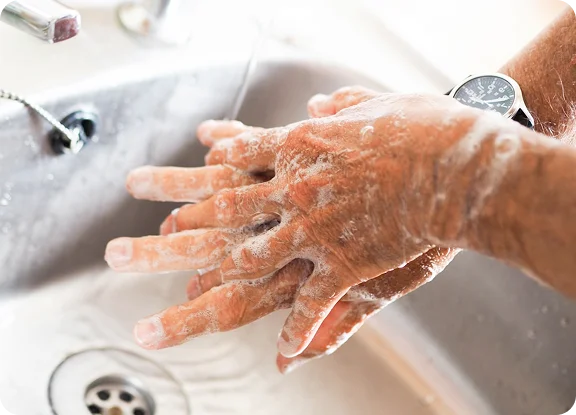Home » Dual Diagnosis Treatment Program in Maine » Obsessive-Compulsive Disorder (OCD)
OCD Treatment in Maine
Find expert help for Obsessive-Compulsive Disorder (OCD) at Liberty Bay Recovery Center. Our OCD specialists provide care that addresses anxiety and related mental health concerns. As a dual diagnosis treatment center, we help you heal from both OCD and substance use disorders with confidence and compassion.

Our Approach to OCD Disorder Treatment
At Liberty Bay, we treat OCD with an evidence-based, personalized care plan. Our OCD therapists guide you through proven therapies, including dual diagnosis care and medication-assisted treatment (MAT) when appropriate. We begin with a full mental health assessment, including OCD screening, to tailor your treatment program.
OCD affects about 2.3% of adults in the US, according to the ADAA. Without treatment, symptoms often worsen. The good news: therapy helps most people manage symptoms effectively.
What to expect from our OCD treatment program:
-
Personalized Treatment Planning:
We create a plan based on your needs, history, and health. -
Dual Diagnosis Expertise:
We treat OCD alongside conditions like addiction, depression, or anxiety. -
Licensed OCD Therapists:
Our team includes experienced, qualified professionals. -
Medication-Assisted Treatment (MAT):
We provide FDA-approved medications when needed. -
Comprehensive OCD Testing:
Our assessment identifies symptoms, severity, and the right care path. -
Therapeutic Modalities:
Treatments include CBT, trauma-informed care, and holistic therapies like yoga.
Our Success Stories
Brian Cahill
5.0/5.0 rating
Kathy Ruiz
5.0/5.0 rating
Aubrey Gillis
5.0/5.0 rating
Joyce Trawick
5.0/5.0 rating
Treatment for OCD and Addiction at Liberty Bay Recovery
OCD therapy works best with consistent support and structure. At Liberty Bay, you get targeted treatment for OCD and addiction at the same time. Our OCD programs are designed to treat both conditions together, starting with a full assessment to create your personalized care plan.
Some of our most effective treatments include:
- Inpatient OCD Treatment: 24/7 medical and therapeutic care with private rooms and chef-prepared meals.
- Partial Hospitalization Program (PHP): Over 30 hours of therapy per week, combining individual and group sessions.
- Intensive Outpatient Program (IOP): 15+ hours of weekly counseling with the flexibility to live at home.
- Cognitive-Behavioral Therapy: CBT for OCD helps reframe intrusive thoughts and reduce compulsive actions.
- Trauma and Psychiatric Services: Comprehensive support for mental health conditions that occur alongside OCD.
- Personality Disorder Treatment: Specialized care for personality disorders that may complicate OCD or addiction recovery.
- Depression Treatment Center: Focused treatment to manage depressive symptoms that often coexist with OCD.
Obsessive Compulsive Disorder Symptoms
OCD symptoms can impact daily life. These symptoms are repetitive, unwanted thoughts or urges that are difficult to control.
Signs of OCD include:
- Fear of germs, harm, or contamination
- Intense need for order, symmetry, or control
- Unwanted aggressive or intrusive thoughts
- Compulsive checking, counting, or cleaning rituals
- Doubts about your actions or decisions
- Mental fixation on specific objects or ideas

What Causes Obsessive Compulsive Disorder?
OCD develops from several factors:
- Genetics: A family history of OCD or anxiety increases the likelihood of developing symptoms.
- Brain Chemistry: Changes in serotonin and other neurotransmitters can impact thought patterns.
- Life Experiences: Traumatic events or major stress can trigger OCD symptoms later in life.
- Personality Traits: Perfectionism or heightened anxiety may raise the risk of obsessive behaviors.
- Environmental Influences: Infections or early learned behaviors can shape compulsive tendencies.

OCD vs. Anxiety
OCD includes anxiety but is marked by compulsions used to reduce distress from obsessions. Anxiety disorders involve worry without these specific rituals.
OCD vs. OCPD
Obsessive-Compulsive Personality Disorder (OCPD) is a separate condition marked by strict perfectionism. OCD involves unwanted thoughts and behaviors that the person often recognizes as irrational.
Dual Diagnosis for OCD and Substance Abuse
OCD and addiction often occur together. People may misuse substances to calm their compulsions or escape intrusive thoughts. Over time, this pattern worsens both conditions.
Our dual diagnosis treatment addresses both mental health and substance use. This comprehensive approach strengthens your recovery and mental resilience. At Liberty Bay, we help you manage OCD while building the skills to avoid relapse.
If you or a loved one is struggling with obsessive-compulsive disorder, reach out today to begin your path toward lasting recovery.
FAQs About OCD
What are the 4 types of OCD?
The four common types are: checking, contamination, symmetry and ordering, and intrusive thoughts.
Is OCD an anxiety disorder?
Yes, OCD is classified as an anxiety disorder because obsessions cause significant distress.
Is OCD a disability?
OCD can be a disability if symptoms are severe enough to limit daily functioning.
Can OCD be cured?
There is no cure, but many people control symptoms well with therapy and medication.
How common is OCD?
About 2.3% of US adults experience OCD at some point in their lives.
What causes OCD to get worse?
Stress, poor sleep, and substance use can worsen OCD symptoms.
What is the best treatment for OCD?
The gold standard is cognitive-behavioral therapy (CBT), especially exposure and response prevention (ERP). It is the most effective treatment and is often combined with medication.
What are the 4 types of OCD?
Is OCD an anxiety disorder?
Is OCD a disability?
Can OCD be cured?
How common is OCD?
What causes OCD to get worse?
Stress, poor sleep, and substance use can worsen OCD symptoms.
What is the best treatment for OCD?
The gold standard is cognitive-behavioral therapy (CBT), especially exposure and response prevention (ERP). It is the most effective treatment and is often combined with medication.
RESOURCES
Addiction Recovery Blog
November 25, 2025
Klonopin (clonazepam) is a prescription medication in the benzodiazepine family, often used to treat anxiety disorders and seizures. It works by calming the nervous...
October 8, 2025
Social media connects us, but it can also subtly chip away at mental well-being. For many of us, scrolling through Instagram, TikTok, or Facebook...
September 8, 2025
Recovery Month in September gives us a chance to talk about different parts of healing during treatment. Part of this is proactive care, which...


